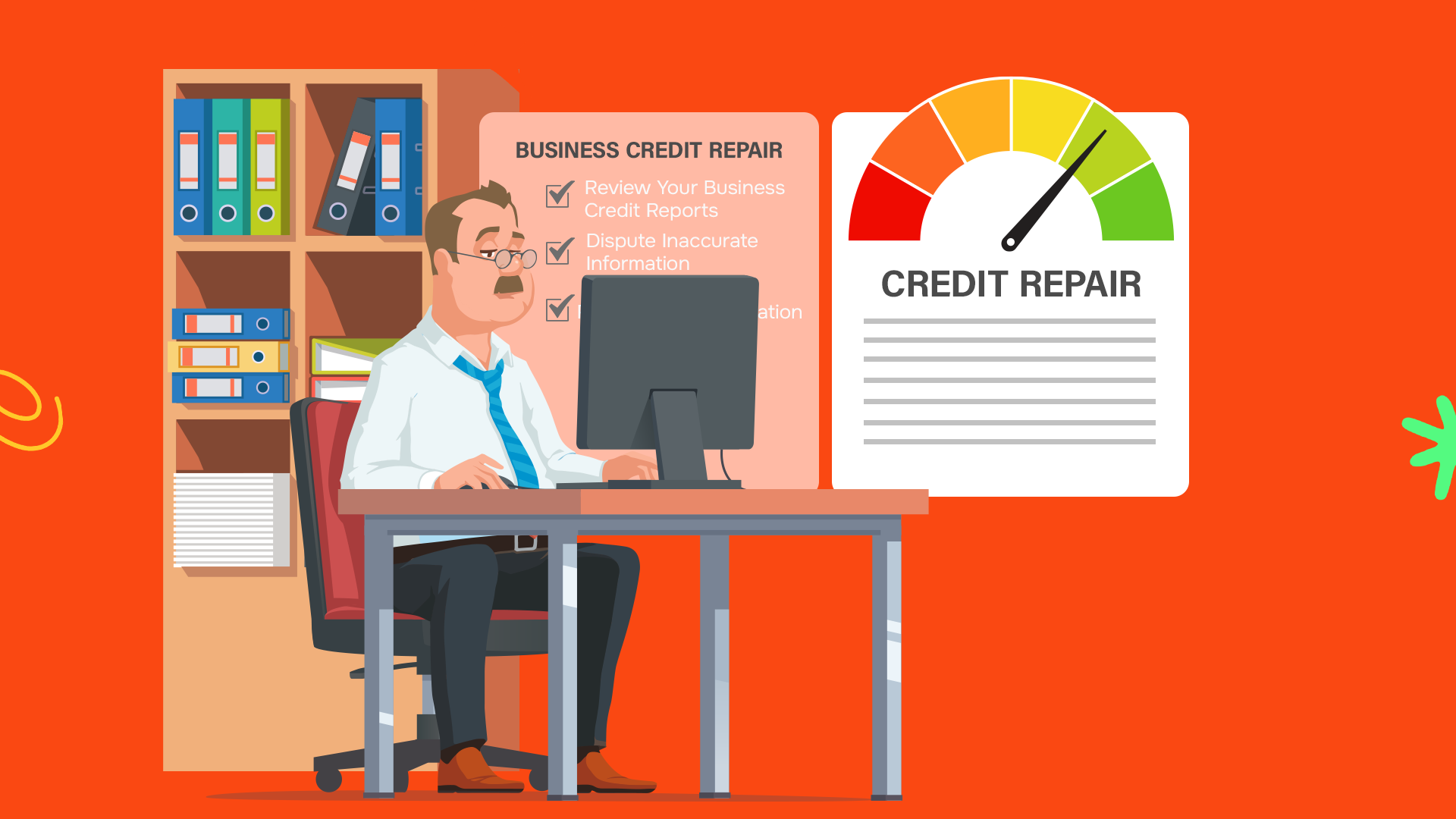How to Fix Your Business Credit—Steps & Tips
Fix the errors on your business credit with these steps and tips, including reviewing your business credit reports, disputing inaccurate information, and more.

Your business credit plays a crucial role in your company’s financial health. A strong business credit score can help you secure better financing terms, qualify for higher credit limits, and build trust with vendors. However, if your business credit is damaged, it can limit your ability to access funding and even affect business partnerships.
Understanding how business credit works and what factors impact your score is the first step toward improvement. Many business owners face challenges due to missed payments, high credit utilization, or errors in their credit reports. Addressing these issues strategically can lead to better financial health and more opportunities for growth.
If your business credit is not where it should be, don’t worry—you are in the right place to take steps to fix it. This guide will walk you through the essential steps and tips to repair your business credit, improve your financial reputation, and position your company for future success.
What Is Business Credit & Why Does It Matter?
Business credit is a financial reputation score that reflects how responsibly your company manages its financial obligations. Just like personal credit, it is based on factors such as payment history, debt levels, and credit utilization. However, business credit is tied to your company’s Employer Identification Number (EIN) rather than your personal Social Security number.
A good business credit score is crucial for financial growth and stability. It allows your business to access funding, negotiate better terms with vendors, and establish credibility in the marketplace. Without a solid credit history, your company may struggle to secure the resources it needs to grow. Here’s why business credit matters:
Securing Business Loans at Favorable Interest Rates
Banks and financial institutions assess your business credit score to determine loan eligibility and interest rates. A higher score means you are a lower risk to lenders, which can lead to better loan terms, lower interest rates, and access to larger amounts of funding. If your business credit is weak, you may face higher interest rates or even struggle to qualify for financing.
Negotiating Better Terms with Suppliers and Vendors
Suppliers often review business credit scores before offering trade credit. A good score allows you to secure longer payment terms, such as net 30 or net 60, giving your business more time to pay invoices without upfront cash requirements. Poor business credit can result in suppliers demanding cash-on-delivery or shorter payment windows, which can strain your cash flow.
Qualifying for Business Credit Cards with Higher Limits
Business credit cards provide essential financial flexibility, helping you cover operational costs and manage cash flow. Companies with strong business credit can qualify for credit cards with higher limits, lower interest rates, and better rewards. On the other hand, a weak credit score may limit your options or result in higher fees and unfavorable terms.
Enhancing Your Business’s Credibility and Reputation
A good business credit score isn’t just about financing—it also affects how potential partners, investors, and clients perceive your company. Businesses with a history of timely payments and responsible credit management are seen as stable and reliable, making it easier to attract investment, secure contracts, and build long-term partnerships.
How Business Credit Scores Are Calculated
Business credit scores are generated by agencies like Dun & Bradstreet (D&B), Experian Business, and Equifax Business. Unlike personal credit scores (which range from 300 to 850), business credit scores typically range from 0 to 100. They are determined by factors such as:
- Payment history (on-time vs. late payments)
- Debt utilization (how much credit you’re using compared to what’s available)
- Business longevity (how long your business has been operating)
- Public records (bankruptcies, liens, or judgments)
According to a 2023 Small Business Credit Survey, nearly 60% of small businesses struggle with access to credit due to poor or limited business credit history. This highlights why fixing and maintaining strong business credit is crucial.
Steps to Fix Your Business Credit
Building and maintaining strong business credit is essential for long-term success. By taking these right steps to improve your score, you can unlock better financing opportunities, strengthen business relationships, and ensure financial stability for the future.
1. Review Your Business Credit Reports
Just like personal credit, business credit reports can contain errors or outdated information that negatively impact your score. Start by:
- Requesting your business credit reports from Dun & Bradstreet, Experian Business, and Equifax Business.
- Reviewing all listed accounts, outstanding balances, and negative marks.
- Identifying errors such as duplicate accounts, incorrect balances, or accounts that don’t belong to your business.
If you find inaccuracies, dispute them immediately with the respective credit bureau.
2. Dispute Inaccurate Information
Errors on your business credit report can lower your score and make it difficult to secure financing. If you spot incorrect information, take these steps:
- Contact the credit bureau reporting the incorrect data (Dun & Bradstreet, Experian Business, or Equifax Business).
- Provide supporting documents that prove the inaccuracy (e.g., payment receipts, account statements).
- Follow up persistently—credit bureaus typically have 30 to 45 days to investigate disputes but credit repair services like credit veto can help you navigate that more swiftly.
Clearing up these errors can result in a faster improvement in your business credit score.
3. Pay Outstanding Debts and Past-Due Accounts
Payment history is the most important factor in your business credit score. If your business has late payments or delinquent accounts, start addressing them right away:
- Prioritize past-due accounts—pay off any overdue invoices or loans first.
- Negotiate with creditors—some vendors may allow you to settle debts for a reduced amount or remove late payment marks if you bring your account current.
- Set up payment reminders—automate payments or set alerts to avoid missing due dates.
According to Experian Business, businesses that consistently pay on time improve their credit scores by 20+ points within a few months.
4. Reduce Credit Utilization
Just like with personal credit, your business credit utilization ratio plays a key role in your score. If your business credit cards or lines of credit are maxed out, lenders may view your business as financially unstable.
- Aim to keep credit utilization below 30% of your total available credit.
- Make multiple payments throughout the month to keep balances low.
- Request a credit limit increase—a higher limit reduces your credit utilization percentage.
Improving your credit utilization ratio can lead to a noticeable boost in your business credit score.
5. Establish Credit Accounts with Vendors
If your business has a limited credit history, one of the best ways to improve your score is by working with vendors and suppliers who report payments to business credit bureaus.
- Look for Net-30 vendors—these are suppliers that allow you to buy now and pay within 30 days.
- Ensure they report to credit bureaus, so your positive payment history is recorded.
- Pay invoices on or before the due date to build a strong track record.
Examples of Net-30 vendors include Uline, Quill, and Grainger, which are known to report to Dun & Bradstreet.
6. Open a Business Credit Card & Use It Responsibly
A business credit card can help you build credit while also giving you access to short-term financing. However, mismanaging it can hurt your score rather than help.
- Choose a card designed for businesses—not a personal credit card.
- Use the card regularly, but avoid maxing it out.
- Pay the full balance each month to avoid high-interest charges.
- Look for cards with rewards and benefits, such as cashback or travel points.
Business credit cards from companies like American Express, Chase, and Capital One can help boost your credit profile when used correctly.
7. Avoid Excessive Credit Inquiries
Each time you apply for business credit, lenders pull your credit report, which results in a hard inquiry. Too many inquiries in a short period can lower your business credit score and signal financial instability.
To minimize the impact:
- Only apply for credit when necessary—don’t submit multiple applications at once.
- Check eligibility requirements first—some lenders offer pre-qualification, which doesn’t affect your score.
- Space out credit applications by at least 3-6 months.
A few strategic inquiries are fine, but excessive applications can hurt your chances of approval.
How Long Does It Take to Fix Business Credit?
The time required to repair your business credit depends on the severity of the issues. On average:
- Correcting credit report errors can take 30 to 60 days.
- Paying off delinquent accounts can take a few months to reflect positively.
- Building credit with vendors can take 6-12 months to show strong payment history.
Consistently following best credit practices will lead to steady improvements over time but with AI- powered credit repair systems like Credit Veto, these processes are shortened to give your desired result efficiently.
Common Business Credit Mistakes to Avoid
To maintain a healthy business credit score, avoid these common mistakes:
- Mixing personal and business finances – Always use a dedicated business bank account.
- Ignoring business credit reports – Regularly monitor your credit reports for errors or fraud.
- Missing payments – Late payments have a lasting negative impact.
- Maxing out credit lines – Keep balances low to improve your utilization ratio.
- Not establishing vendor credit – Working with reporting vendors helps build your credit history.
How Credit Veto Can Help Restore Your Business Credit
Fixing business credit can be overwhelming, but you don’t have to do it alone. Credit Veto offers expert credit repair services to help businesses:
- Dispute errors and inaccuracies on business credit reports
- Negotiate with creditors to remove negative marks
- Develop a customized credit-building plan for long-term success
We offer affordable, transparent pricing with no hidden fees. Take advantage of our Free 90-day free credit repair starter pack and start rebuilding your business credit today.
Take control of your business credit—Sign up with Credit Veto now to fix your business credit and give it that credit score it deserves!




Comments ()